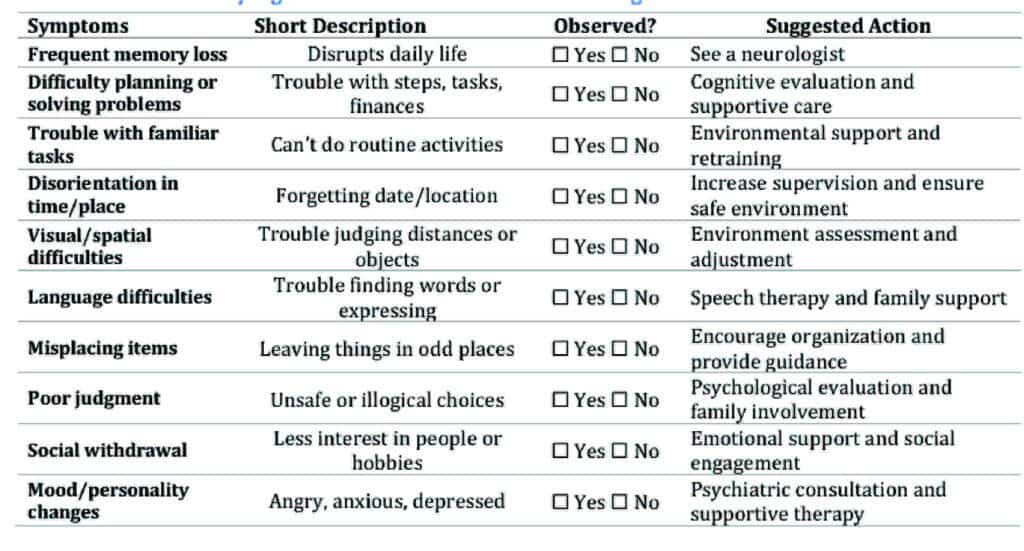Early Signs of Dementia in Elderly | Author: Elham Sharifi Ghorveh, |Cognitive Health Specialist (Research & Advisory) at Rose Hill Care at Home
Learn the 10 most important early signs of dementia with practical
examples. Recognizing early dementia symptoms helps us to improve care and quality of
life.
Dementia is a nonspecific condition that gradually affects cognitive abilities and daily
functioning. Recognizing the early signs of dementia can help families and caregivers begin
the right treatment plan and improve the quality of life for the person affected.
For many reasons, it is important to recognize early warning signs of dementia:
– Better treatment and slower progress of the disease: Early diagnosis lead to more
effective treatment and care strategies.
– Creating appropriate care: Families can create custom care plans tailored to the
person’s state.
– Remaining independent: Knowing about the changes makes it easier to modify the
environment so the person can remain involved with activities of everyday living.
– Decreasing anxiety for families and caregivers: Understanding what to expect and
how to manage prevents anxiety and enhances the utilization of existing resources.
So we have to know Early Signs of Dementia in the Elderly.

Description: Forgetting newly learned information, appointments, asking a question again,
or searching for misplaced items. This is more than normal forgetfulness.
Example: Selen, 68, often asks her family where she put things, even though she put them
back herself just minutes earlier. She once misplaced her wallet, and when she reported it
lost, her daughter discovered it inside her refrigerator.
Description: Challenges in managing tasks that require organization, such as paying a bill,
shopping, or cooking. People may forget steps or get confused.
Example: Jack, who always managed the household bills, now struggles to remember how to
pay them, sometimes paying the same bill twice, or doesn’t pay it at all.
Description: Difficulty doing routine activities like cooking, dressing, or using the phone.
Activities that were formerly automated are now conscious and accompanied by instruction
and guidance.
Example: Kate, who used to be skilled in the kitchen, now can not prepare simple meals
independently, and sometimes she forgets to turn off appliances.
Description: Confusion about dates, seasons, or current location. The person may get lost
even in familiar settings.
Example: Stephen got lost on a walk in a nearby park and couldn’t find his way home. It
caused hours of distress for his family.
Description: They can’t judge distance, depth, or color contrast, so this can increase the risk
of their falls or accidents.
Example: Thomas had trouble estimating the distance of cars when crossing the street, and
it comes to have an accident multiple times.
Description: It is difficult for them to find the right words, repeating themselves, or using
vague terms. Every day, conversations become challenging.
Example: Walter often replaces words like “book” with vague terms like “that thing,” and it
makes his sentences unclear for others.
Description: Putting things in unusual places and forgetting where they are. It is even
possible to accuse others of stealing.
Example: Ashley repeatedly left her phone in the fridge or random cabinets and believed
someone had taken it.
Description: having risky or illogical choices, overspending, unnecessary purchases,
neglecting hygiene, etc.
Example: Arthur, once very rational, suddenly spent large amounts of money on low-quality
snacks and nonessential items.
Description: Don’t care about hobbies, events, or spending time with family and friends.
Example: Sarah gradually stopped attending gatherings and preferred to spend most of her
time alone.
Description: Have sudden mood swings. (anger, depression, anxiety, or emotional flatness.)
Example: David, once calm and gentle, became irritable and aggressive, straining his
relationship with family.

Recognizing the Early Signs of Dementia in the Elderly is essential to prevent more serious consequences
and improve the quality of life for both the person affected and their loved ones. If you
observe any of these signs, consult a neurologist or psychiatrist for full evaluation and care
planning.
Alzheimer’s Association. (2023). Early Signs of Dementia. https://www.alz.org/alzheimersdementia/10_signs
Mayo Clinic. (2024). Dementia symptoms. https://www.mayoclinic.org/diseases-conditions/dementia/symptoms-causes/syc-20352013
World Health Organization (WHO). (2022). Dementia. https://www.who.int/news
room/fact-sheets/detail/dementia
Petersen, R.C. (2016). Mild Cognitive Impairment. Continuum (Minneap Minn), 22(2
Dementia), 404-418.
🧠 Feel free to message Elham Sharifi Ghorveh, our Cognitive Health Specialist, for guidance and answers.
📩 She’s here to support families and caregivers every step of the way.